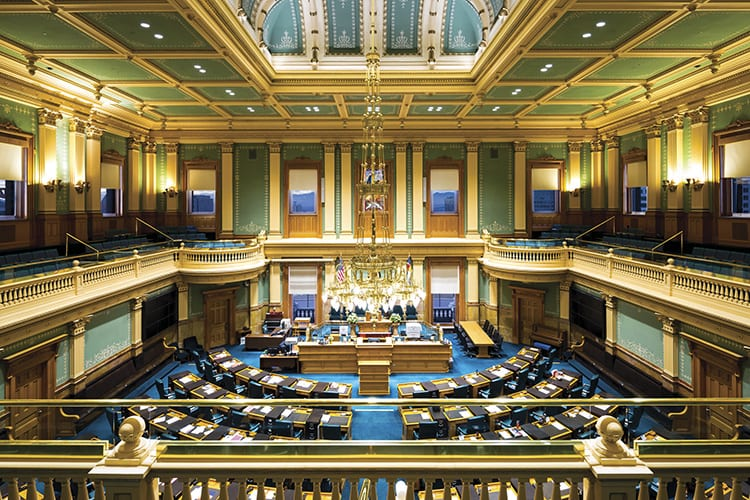
Rabbi Joseph R. Black – Temple
Emanuel
June 27, 2025
As you can tell by the sling that I am wearing, I am dealing with the loss of the use of my left arm for quite a while. I’ve had to tell and retell the story of what happened many times, so here’s the Cliff Notes version:
- 2 weeks ago, I tore the tendons of my left bicep and then I had surgery following Ethan and Zahava’ s wedding.
- What my surgeon basically had to do - without being too graphic - was to take the connecting tissue – the torn tendons attached to my bicep that were separated and reattach them to the bone.
- I will be unable to use my left arm fully for a few months - and that also means that I can't play the guitar... which is hardest for me frankly.
- But I know that, with time , patience, and physical therapy, I will be good as new in a few months.
In contemplating what I would say
to you tonight on my last Erev Shabbat sermon as your Senior Rabbi
- I thought about the symbolism of the
connecting tissue that was being repaired in my arm.
I couldn’t think of a more
perfect metaphor…
In many ways, the past 43 years since I began the journey of becoming a rabbi has been all about making connections:
- between Judaism and individuals
- Between people – in families, in community
- between colleagues
- with communal and religious leaders,
- with Torah, tradition and history
- At moments of powerful joy and at moments of painful loss
In the last analysis, rabbis are like
tendons. We bring people, text, tradition and time into focus for others. The
sacred work that we do is akin to the connecting tissue that makes everything
work in our community.
But the more I thought about it,
the more I realized that, just as the complexities of arm surgery - where there
are multiple nerve endings, muscles, sinews and bones that need to be carefully
and tenderly cared for - there are also multiple aspects of what it means to be
connected to a community and to one another.
This past week, we held our
collective breaths as Israel, Iran, and the United States got intertwined in this
horrible war and came perilously close to a much wider conflict. Most of us, I would wager, felt a powerful
connection to our brothers, sisters,
family and friends in Israel.
We prayed and followed on our
television sets, social media platforms, and listened to reports as we worried
about our loved ones in Israel who were huddled in bomb shelters and safe rooms
– those who lived there as citizens, those who were visiting and couldn’t get
out.
And we also felt the pain of the
innocent Palestinians and Iranians caught up in the crossfire of a deadly
conflict.
Certainly, we were connected by
our love of Israel and our concern about the existential threat that Israel has
been facing since October 7th, 2023.
Regardless of our feelings about the current government, or how the war
in Gaza has played out, our hopes for the release of the remaining hostages and
an end to this conflict unites us all.
And yet, Israel is no longer a
universal connector for the Jewish people.
Increasingly, The Jewish State is becoming a difficult and divisive
topic – a flash point that is causing painful rifts in our community.
As I think about how the world
has changed since I entered rabbinical school 43 years ago in 1982, one of the
key differences I see is how we relate to one another and the disturbing unravelling
of much of the Metaphorical “connecting tissue” that has been a given in terms
of how we see ourselves in relationship to one another and the world around us.
I am worried that we are facing a
looming crisis in the American Jewish community as we watch so many values,
assumptions, and behaviors that have kept us strong and united for generations
begin to unravel.
The advent of the Internet, and
so many other important technological advances have given us many wonderful
gifts. The fact that so many people are attending this service - both in person
and online is truly blessing!
But, these gifts have come at a price. We are becoming disconnected:
- from families
- from our faith
- from our values
- from Zionism
- from one another
- from the basic institutions that have kept us strong, and, ultimately,
- from God.
The role of the rabbi, of
community leadership and the shared values upon which so much of our history
has been based are all rapidly evolving as we navigate the rapid changes
occurring around us.
Rabbis Sacks and Hyatt – and the
entire congregation – are facing a very different world than the one in which I
began my rabbinate. The centrality of the synagogue and the role of the rabbi
as community leader is not the same as it once was. There are myriad options
for Jewish life, connection and involvement. Some of these changes are
positive. Some have the potential to be
destructive.
This week's Torah portion, Korach,
could not be more prescient. It is all about challenges to leadership and
continuity. It tells the story of a
rebellion against Moses and Aaron in the wilderness. In numbers 16: 1-3, we
find the following:
וַיִּקַּ֣ח קֹ֔רַח בֶּן־יִצְהָ֥ר
בֶּן־קְהָ֖ת בֶּן־לֵוִ֑י וְדָתָ֨ן וַאֲבִירָ֜ם בְּנֵ֧י אֱלִיאָ֛ב וְא֥וֹן
בֶּן־פֶּ֖לֶת בְּנֵ֥י רְאוּבֵֽן׃
Now Korah, son of Izhar son of
Kohath son of Levi, took himself, along with Dathan and Abiram sons of Eliab,
and On son of Peleth—descendants of Reuben — to rise up against Moses, together with two hundred
and fifty Israelites, chieftains of the community, chosen in the assembly, men
of repute. They combined against Moses and Aaron and said to them, “You have
gone too far! For all the community are holy, all of them, and יהוה is in their midst.
Why then do you raise yourselves above יהוה’s congregation?”
On the surface, his words are not
all that blasphemous: , “You have
gone too far! For all the community are holy, all of them, and יהוה is in their midst.
Why then do you raise yourselves above יהוה’s congregation?”
After all we are
all holy. And God is in our midst.
And yet, Korach and his followers
were severely punished by God, and Moses's leadership was firmly cemented among
the people. Why?
·
Rashi: commenting on the Hebrew word, וַיִּקַּ֣ח (vayikach – “and he took”
o
“He betook himself on one
side with the view of separating himself from out of the community.
What was Korach’s crime?
He removed himself. He separated
himself. He Set himself apart from the connecting tissue that bound all of the
Israelites together.
And as I enter into this last
Shabbat as your senior rabbi, I want to leave you with words of connection.
Temple Emanuel is a remarkable and holy congregation. Under the inspired
leadership of your new Sr. Rabbis and their team, I know that the tradition of
excellence, caring, spiritual depth and commitment to the Jewish future that
has always been central to our sacred community will not only continue on - but
will shine brighter than ever.
Over the past several weeks,
people have been asking me how I feel as I approach this new stage in my life.
Am I excited? Nervous? Sad? And the
answer, of course, is Yes – all of the above.
But of one thing I am absolutely
certain: Temple Emanuel is at a vitally important crossroads. We are in a time of radical change. We face
multiple challenges as we address the upheaval taking place around us. And I am thrilled that Rabbis Hyatt and Sacks
and Steve Stark – your Senior Leadership team - as well as Steve Brodsky, Rabbi
Margo and Cantor Lehrman – along with the rest of our incredible staff team and
lay leadership – are exactly the right people to lead us – to strengthen the
connecting tissue that binds us together and that stretches from Mr. Sinai to
Denver.
I have loved being your rabbi –
and I know that there will be more opportunities to be part of the “connecting
tissue” that will continue to hold us all together In my new role as Rabbi Emeritus. I will miss being part of the daily life of
our congregation. But I am also looking forward to what comes next: music,
travel, family time. While I won’t be here a lot for the first year – I will
always be part of Temple Emanuel. I look forward to being a “Jew in the pew”
with Sue…
My blessing at this holy moment
is that we will continue to grow - in size, in spirit, in creative innovation,
and in maintaining the tradition and magic that fills the spaces of this beautiful
building, as well as the hearts and souls of all who are part of our holy
community.
May we embrace and find ourselves intertwined within the connective tissue of Jewish life – and may we go and grow from Strength to Strength.
AMEN – Shabbat Shalom.



